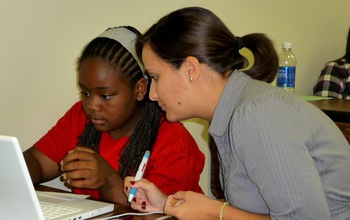News Release 14-027
White House Champions of Change include educators supported by NSF
Researchers Kimberly Scott and Kevin Clark engage students from underrepresented groups in hands-on work with technology

CompuGirls combines advanced computational skills learning with key areas of social justice.
February 25, 2014
This material is available primarily for archival purposes. Telephone numbers or other contact information may be out of date; please see current contact information at media contacts.
Kimberly A. Scott and Kevin Clark are among 10 educators and innovators being named STEM Access Champions of Change at the White House during an event on Feb. 26 to honor individuals working to support and accelerate STEM (science, technology, engineering and math) opportunities for African American students, schools and communities. The event will be live-streamed.
Scott, Women and Gender Studies associate professor in the School of Social Transformation at Arizona State University, founded and leads CompuGirls. The program combines advanced computational skills learning with key areas of social justice, creating skills and interest among adolescent girls in technology and computer science.
"Being named a STEM Access Champion of Change is not only a distinct honor, but also an acknowledgement of the need to teach girls technological skills in an engaging and transformative way," Scott said. "Bringing girls from underserved communities into the digital world ultimately will add intellectual diversity and talent to our country's workforce."
Clark is director of the Center for Digital Media Innovation and Diversity and professor in the College of Education and Human Development at George Mason University. He is being honored for his innovative approach to creating diversity and access in STEM fields.
"I am truly humbled and appreciative to receive this award," said Clark, who will be joined at the White House by his wife, son, and daughter as well as doctoral student Asia Williams and her husband.
Scott saw the need for a program to teach girls advanced technological skills in 2007 when she started CompuGirls and only 10 percent of middle-school girls rated the computer science profession as a "very good" choice for them, according to NSF data.
A 2012 study by the National Center for Women and Information Technology reported that African American and Hispanic women represent only 3 percent and 1 percent of the United States computing workforce. Native American women majoring in computer and information sciences represent less than 1 percent.
Part of the issue is that girls see programming or other technology careers as culturally irrelevant, not as a tool to reach their goals, Scott said. When they are engaged in social justice issues that are important to them, girls learn the technology as a means to build their projects. Girls use technology as a tool through the program to address complex issues such as child abuse, indigenous language and culture loss, and gentrification. Starting as eighth graders, girls who participate are from underserved school districts and are predominantly Hispanic, African American and Native American.
By providing fun programs where participants learn the latest technologies in digital media, game development and virtual worlds, girls learn skills such as digital media production with photo editing software, documentary filmmaking, game design and simulations with Scratch and virtual world creation with open-sim technology.
Scott originally developed CompuGirls with support from the Arizona Community Foundation. Recently, the National Science Foundation awarded multiple large grants to bring the program to girls in school districts in the Phoenix-metro area, including at the Gila River Boys and Girls Club in Sacaton and Komatke, Ariz., part of the Gila River Indian Community. The program has since expanded to Colorado.
Clark's recent activities have focused on the use of video game design to increase interest in STEM careers; examining pathways and best practices for increasing diversity in STEM disciplines; and issues of diversity in the design and development of educational media products. In addition to his scholarly activities, Clark has extensive experience as a designer and consultant in the areas of educational video game design, online and interactive media, and issues of diversity and inclusion in children's media. He received an NSF grant in 2007 for a project titled, Game Design Through Mentoring and Collaboration.
The two educators work together as co-leaders of STEM For All, also funded by NSF, a project that brings together a diverse group of researchers, practitioners, funding organizations and policy analysts to work on developing a forum where an interdisciplinary team shares knowledge and devises agendas and action items that lead to broadening understanding and pragmatic solutions for traditionally underserved students to enter and persist in STEM fields.
The Champions of Change program began in 2011 when President Barack Obama called for recognition of citizens doing extraordinary things at a local level. Champion of Change honorees are chosen through a rigorous nomination and selection process. Four NSF-funded scientists were among the Champions of Change honored in 2013. Previous NSF-supported honorees include Liesl Chatman, Elisabeth Hayes, Bobby Schnabel, Virginia Stern , David Rose, Christine Reich, George Kerscher, and Henry Wedler.
Watch the Champions of Change event live, at 10:00 a.m. ET on Feb. 26. To learn more about the White House Champions of Change program or to nominate a champion, visit the Champions of Change website.
-NSF-
-
Through CompuGirls, participants learn the latest technologies in digital media production.
Credit and Larger Version -
Scott saw the need for a program to teach girls advanced technological skills in 2007.
Credit and Larger Version -
Clark has focused on the use of video game design to increase interest in STEM careers.
Credit and Larger Version -
Clark was selected for his innovative approach to creating diversity and access in STEM fields.
Credit and Larger Version
Media Contacts
Maria C. Zacharias, NSF, (703) 292-8454, email: mzachari@nsf.gov
The U.S. National Science Foundation propels the nation forward by advancing fundamental research in all fields of science and engineering. NSF supports research and people by providing facilities, instruments and funding to support their ingenuity and sustain the U.S. as a global leader in research and innovation. With a fiscal year 2023 budget of $9.5 billion, NSF funds reach all 50 states through grants to nearly 2,000 colleges, universities and institutions. Each year, NSF receives more than 40,000 competitive proposals and makes about 11,000 new awards. Those awards include support for cooperative research with industry, Arctic and Antarctic research and operations, and U.S. participation in international scientific efforts.
Connect with us online
NSF website: nsf.gov
NSF News: nsf.gov/news
For News Media: nsf.gov/news/newsroom
Statistics: nsf.gov/statistics/
Awards database: nsf.gov/awardsearch/
Follow us on social
Twitter: twitter.com/NSF
Facebook: facebook.com/US.NSF
Instagram: instagram.com/nsfgov




